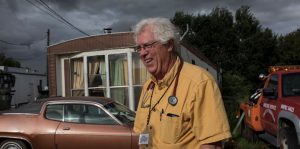
Early in the healthcare documentary The Providers, we see a striking statistic: “Last year, 70,000 deaths in rural America could have been prevented with better access to healthcare. That’s ten times the number of Americans who died in the Afghanistan and Iraq wars combined.” This is true—it’s also true that some estimates of the total civilian deaths reach as high as 200,000. It’s an odd, distracting way to begin the movie. Why are we only talking about American deaths? Do they matter more than non-American ones?
The opening statistic was likely selected for its “wow” factor, not any particular political message. The Providers isn’t out to help viewers understand these deaths in a systemic, policy-based way. It’s after an emotional shock to the system, a humanistic confrontation with everyone involved in rural America’s collapsing healthcare infrastructure. That includes the titular providers along with their patients: victims of old age, alcoholism, and the opioid crisis.
Directors Anna Moot-Levin and Laura Green center the film on three healthcare workers in the El Centro system of health clinics in New Mexico. There’s Leslie Hayes, a family physician; Chris Ruge, a nurse practitioner; and Matt Probst, the medical director of El Centro. We follow them at work and at home as they care for patients and try to keep the underfunded, understaffed clinics afloat.

“…a humanistic confrontation with everyone involved in rural America’s collapsing healthcare infrastructure.”
The movie’s central strength and weakness is that it doesn’t judge anyone onscreen. The addicts who appear for checkups and counseling are victims of a disease; they haven’t chosen to do anything wrong. Every time we see them, they seem so earnest about trying to get help. We don’t need to rally behind any particular cause to “get” The Providers; it is enough to simply observe these people struggling and empathize with the brutal facts of their hardship.
Meanwhile, the movie’s treatment of the healthcare professionals is downright hagiographic. Chris Ruge doesn’t have any time for his family because he spends all day driving around to check up on patients; Matt Probst has grown up from a 12-year-old coke slinger to the director of a massive network of clinics (Leslie Hayes largely disappears from the movie after a while, maybe because her story isn’t as dramatic). The turmoil that Chris and Matt experience in their personal lives on top of their jobs makes them seem like superheroes. How is it possible for one person to handle all of this? We watch and marvel at people who are capable of so much.
It’s this worshipful distance that rubbed me the wrong way in The Providers. Don’t get me wrong: it’s a technically accomplished documentary that tries to balance all of its subjects gracefully. There are moving scenes where brutal images of rural American poverty confront the viewer. On the other hand, it is at once credulous about the intentions of everyone onscreen and canny about avoiding any kind of controversial statements. It is so focused on the beautiful struggle of healthcare workers overcoming obstacles that it forgets to tell the audience what those obstacles are. Despite being a 2018 film about America’s disastrous healthcare system, I didn’t hear the words “universal healthcare” or “Medicare for all” once. Instead, we hear about “lack of resources” and “underserved communities.”

“…turned it into a sourceless existential threat.”
Maybe the filmmakers clearly buy into the notion that “personal, human” storytelling can’t or shouldn’t be “political” or “ideological.” But what they have done is taken a systemic injustice—the havoc that opioid pushers and predatory health insurance companies have wreaked on rural America—and turned it into a sourceless existential threat. The Providers would have us believe that more experienced, inspired local doctors—more boots on the ground—would fix New Mexico and, by extension, the rest of the country. Of course, that is needed, but the film doesn’t ask why, or what needs to happen first.
Every story needs heroes in addition to villains, and as a piece of a bigger picture, The Providers isn’t bad. But after watching it, I have no idea what anyone onscreen thinks the large-scale solutions are. Maybe the “providers” are Republicans who love Big Pharma and massive copays. Maybe they’re democratic socialists. The filmmakers could have asked. By not asking, they are providing a simple narrative about empathetic doctors with strong work ethics, and the bigger picture disappears from view.
The Providers (2018) Directed by Anna Moot-Levin and Laura Green. With Chris Ruge, Matt Probst, Leslie Hayes.
6 out of 10 stars
